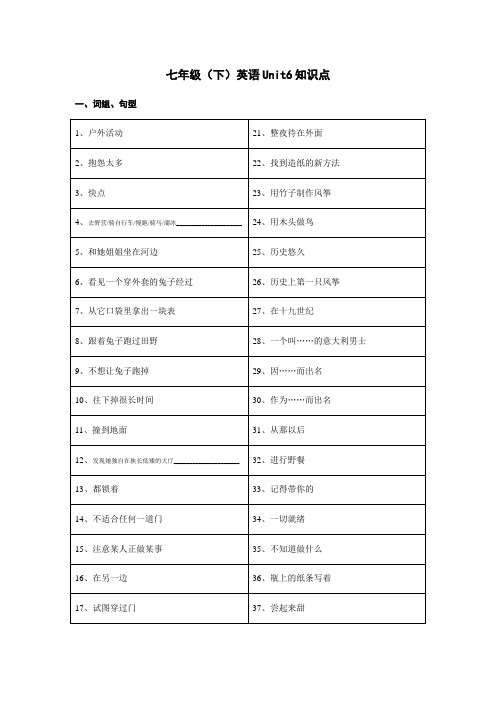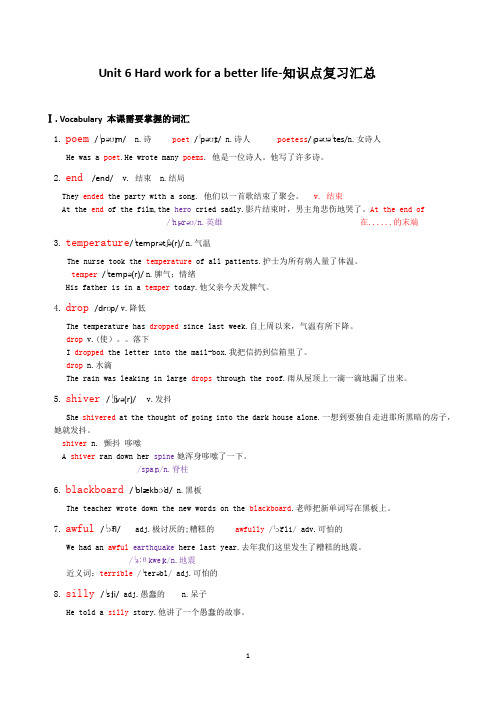七年级英语下册 Unit 6 重点、难点和疑点全攻略 牛津版
七年级英语 Starter Unit 6 In the park重难点解析 牛津版

Starter Unit 6 In the park1 in the park在公园★重点词汇 eat吃run跑步rubbish垃圾pick摘,捡play玩,游戏ball球 walk走,散步 grass草地 bicycle自行车football足球bring带来 dog 狗★语法聚焦1.祈使句的用法: Look at the sign.看这个标记; 2.祈使句的否定:Don\'t... Don\'t swim here.不要在这里游泳;3.时间的表达法;4.现在进行时be + doing的用法。
课文英汉对照Look and sayAt four o\'clock, 4点钟,Eddie and Danny,in the park. 埃迪和丹妮在公园里。
A boy is riding his bicycle in the park.一个男孩正在公园里骑自行车。
Don\'t ride your bicycle here. 不要在这里骑车。
Why not? 为什么不让?Look at the sign 看这个标志!1.时间的表达方法有三种:(1)先说几点,再说几分,如seven twenty 7点20分(2)半小时以内的时间是“几分+past+几点”,如ten past six 6点10分(3)过了半个小时的时间是,\"(60一原分钟数)+ to十(原钟点数+1)\",如five to二8点55分[注] 时间前如需要加介词可加at,对时间提问用What time is it?或What is the time?2. Don\'t ride your bicycle here.不要在这里骑车。
此句是祈使句的否定形式,只需在析使句的肯定形式前加Don\'t,表示“不要……”①Don\'t close the door.不要关门。
②Don\'t eat.不要吃。
英语Unit6教案译林牛津版七年级下

英语Unit 6 教案译林牛津版七年级下一、教学内容本节课选自译林牛津版七年级下册Unit 6,主要内容包括:Grammar focus:一般将来时;Reading:未来职业规划;Vocabulary:与职业相关的词汇。
具体章节为:6.16.3。
二、教学目标1. 掌握一般将来时的用法,并能运用到实际情境中进行交流。
2. 能够理解和运用与职业相关的词汇,谈论未来职业规划。
三、教学难点与重点1. 教学难点:一般将来时的构成及用法;与职业相关的词汇的运用。
2. 教学重点:掌握一般将来时;阅读理解及词汇运用。
四、教具与学具准备1. 教具:多媒体设备、PPT、黑板、粉笔。
2. 学具:课本、练习本、文具。
五、教学过程1. 导入:通过展示一组未来职业的图片,引发学生对未来职业的思考,为新课学习做好铺垫。
2. 新课导入:讲解一般将来时的用法,通过例句和练习进行巩固。
3. 阅读理解:学生自主阅读6.16.3,完成相关练习,提高阅读能力。
4. 词汇学习:学习与职业相关的词汇,通过小组讨论,运用词汇谈论未来职业规划。
5. 随堂练习:设计相关练习题,巩固一般将来时和词汇学习。
6. 例题讲解:针对练习中的难点和重点进行讲解。
六、板书设计1. Unit 6 Future careers2. 内容:Grammar focus:一般将来时Reading:6.16.3Vocabulary:与职业相关的词汇七、作业设计1. 作业题目:根据所给职业词汇,编写一段关于自己未来职业规划的文字。
完成课后练习6.46.6。
答案:1. 作业题目一:I want to be a teacher in the future. I will studyhard and learn more about education. I believe that I canmake a difference in the lives of my students.作业题目二:见课后练习答案。
Unit6Reading知识清单牛津译林版英语七年级下册

牛津译林版七年级下册 Unit 6 知识清单(二)Reading【知识精讲】1.by:prep.“在……旁边”(by the window)。
→by + 时间“到……时”(by the end of the month)。
→by + 地点“在……旁”(by the river)。
→by + 交通工具“乘……”(by train)。
→by用于被动语态“被……,由……”。
→by the way“顺便问一下”;by oneself“独自”。
2.look相关短语:look up“向上看;查阅,查找”(跟代词作宾语,代词放在中间)。
look at“看”;look after“照顾”;look like“看起来像……”;look through“浏览”;look around/about“环顾”;look for“寻找”;look forward to (doing sth.)“期待”。
3.see sb. doing sth.“看见某人正在做某事”(强调动作正在进行)。
see sb. do sth.“看到某人做某事”(看到整个过程,也可以指看到某人经常做某事)。
4.“in + 颜色”表示穿着什么颜色的衣服。
5.pass by = walk/go past“经过”。
6.感叹句:How + 形容词/副词(+ 主语+ 谓语)!What + a/an + 形容词+ 单数名词(+ 主语+ 谓语)!What + 形容词+ 可数名词复数/不可数名词(+ 主语+ 谓语)!7.take...out of“把……从……拿出来”。
→get out of...“从……里面出来”。
→jump out of...“从……里面跳出来”。
→look out of...“从……朝外看”。
→push sb./sth. out of...“把某人/某物从……推出来”。
→run out of...“从……跑出来”。
8.run across“跑过;偶然遇见”。
Unit6知识点江苏省牛津译林版七年级英语下册

七年级(下)英语Unit6知识点一、词组、句型二、词汇运用1. He was __________________ (surprise) to see many birds in the zoo.2. There are lots of flowers on both __________________ (side) of the river.3. Lucy is too young to look after __________________ (she) well.4. After hearing the good news, we were all __________________ (excite).5. Jim usually walks to school, but he __________________ (ride) to school this morning.6. That man lived in the Warring States __________________ (时期)7. Simon was very fat and he couldn't go __________________ (通过) the small door.8. She __________________ (跌落) down from her bike and hurt her leg.9. Jim __________________ (击中) the ball and won (赢) the game.10. Did you ________________ (注意) the special bowl five ________________ (世纪) ago?三、单项选择1. He said he saw ___________ UFO yesterday, and he took ___________ photo of it.A. a; aB. an; theC. a; theD. an; a2. Nanjing is famous ___________ an old city ___________ a long history.A. as; hasB. for; withC. as; withD. for; has3. A note on the desk ___________ “I'll be back in three hours.”A. wroteB. spokeC. sayD. said4. Can Lily speak English?Yes, but only ___________.A. fewB. a fewC. littleD. a little5. This girl wanted to keep fit so she decided ___________ sports.A. to doB. didC. doingD. of doing6. This flat isn't ___________. We have to buy a bigger one.A. small enoughB. big enoughC. enough smallD. enough big7. He was ___________ tired ___________ the bag. He stopped to have a rest.A. so; to carryB. too; carryingC. too; to carryD. that; carrying8. Andy ___________ her homework again. The teacher was very angry.A. forgot bringingB. forgets to bringC. forgets bringingD. forgot to bring9. Can you ___________ the sugar here?No. Would you please pass it to me?A. reachB. wantC. needD. like10. He ___________ to China last year and ___________ in love with this country.A. goes; fallsB. went; fellC. went; feltD. went; were11. It is very important not to give rabbit ___________ carrots.A. much tooB. too manyC. much tooD. many too12. Jim, I am sorry I used your puter while you were away this morning.___________.A. That's all rightB. e onC. That's rightD. All right四、动词填空1. Andy drank a little. It __________________ (taste) sweet.2. Do you know what __________________ (do) next?3. __________________ he __________________ (play) his guitar yesterday?No, she practiced __________________ (play) the piano.4. The girl stopped __________________ (cry) after his mother gave him a toy.5. ______________ (not forget) ______________ (taste) the fish before you give it to others.6. They often __________________ (write) to each other when they were young.7. Who __________________ (teach) you English 6 years ago?8. There __________________ (be) a football match on TV yesterday morning,but he __________________ (have) no time to watch it.五、句型转换1. He used wood to make the first bird in history. (改为同义句)He ___________ the first bird in history ___________ ___________ wood.2. She has enough free time. She can help you with the work. (改为同义句)She is___________ ___________ ___________ help you with the work.3. Sandy did some cleaning at home last weekend. (改为否定句)Sandy ___________ ___________ ___________ cleaning at home last weekend.4. After they walked into the museum, the teacher gave them books. (对画线部分提问)_________ ________ the teacher _________ them after the students _________ the museum?5. Simon, don't forget to bring your mobile phone here. (改为同义句)Simon, ___________ ___________ bring your mobile phone here.六、完成句子1、上海以其发展闻名全世界。
牛津译林版英语七年级下册 Unit 6 重点内容总结

牛津译林版英语七年级下册 Unit 6 重点
内容总结
本单元主要涵盖了以下几个重点内容:
1. 单词和短语:本单元的重点单词包括ship, island, festival, celebrate等。
短语部分包括go on vacation, take part in等。
学生需要熟练掌握这些单词和短语的拼写和用法。
2. 语法:本单元主要研究了一般现在时和过去式的用法。
学生需要学会根据不同的情况使用这两种时态,并且能够正确地变化动词的形式。
3. 阅读理解:本单元的阅读理解主要涉及到介绍节日和旅行的文章。
学生需要通过阅读理解文章,获取相关信息并回答问题。
4. 听力:本单元的听力主要涉及到询问和回答有关旅行和节日的问题。
学生需要通过听力理解问题并正确回答。
5. 写作:本单元的写作任务是写一篇关于自己参加过的节日活动的经历。
学生需要描述活动的内容和感受,并使用正确的语法和词汇。
总体来说,本单元的重点内容是单词和短语的掌握、语法的运用、阅读理解的技巧、听力理解能力和写作能力的提高。
学生应通过课堂练和自主研究,加强对这些内容的掌握和应用。
以上是对牛津译林版英语七年级下册 Unit 6 重点内容的简要总结。
牛津上海七年级英语下册Unit 6 Hard work for a better life知识点复习

Unit 6 Hard work for a better life-知识点复习汇总Ⅰ.Vocabulary本课需要掌握的词汇1.poem /ˈpəʊɪm/ n.诗poet /ˈpəʊɪt/ n.诗人poetess/ˌpəʊəˈtes/n.女诗人He was a poet.He wrote many poems. 他是一位诗人。
他写了许多诗。
2.end/end/ v. 结束 n.结局They ended the party with a song. 他们以一首歌结束了聚会。
v. 结束At the end of the film,the hero cried sadly.影片结束时,男主角悲伤地哭了。
At the end of/ˈhɪərəʊ/n.英雄在......的末端3.temperature/ˈtemprətʃə(r)/ n.气温The nurse took the temperature of all patients.护士为所有病人量了体温。
temper /ˈtempə(r)/ n.脾气;情绪His father is in a temper today.他父亲今天发脾气。
4.drop /drɒp/ v.降低The temperature has dropped since last week.自上周以来,气温有所下降。
drop v.(使)。
落下I dropped the letter into the mail-box.我把信扔到信箱里了。
drop n.水滴The rain was leaking in large drops through the roof.雨从屋顶上一滴一滴地漏了出来。
5.shiver /ˈʃɪvə(r)/ v.发抖She shivered at the thought of going into the dark house alone.一想到要独自走进那所黑暗的房子,她就发抖。
牛津英语七年级下册第六单元知识点详解.doc

牛津英语七年级下册第六单元知识点详解一、课文知识讲解1. Hobo, carry it for me.霍波,帮我拿一下。
(1)carry,动词,“搬,拿”它的第三人称单数形式为“carries”,carry sth for sb意为“为某人搬某物”Hobo often takes newspapers for me.(2)本句是一个祈使句,以动词原形开头,表示请求对方去做某事。
如果不想让对方去做,可以在句首加上don’t.如:Don’t carry it for me.2. You complain too much. The bag isn’t that heavy.你抱怨得太多了,这个包不是那么重的。
(1)complain too much“抱怨得太多”, too much用来修饰动词,表示程度,如eat too much吃的太多(2)that相当于so,翻译成“那么,那样”,是表示程度的副词The old man cannot walk that far.辨析too much和much too英语中too much与much too虽然表面上只是词序颠倒的差别,但实际上,这两个词不论在意义上还是在用法上都有所不同。
too much的意思是“太多”,much too的意思是“在很大程度上太……”。
现将它们二者的具体用法举例如下:too much 1.相当于形容词,意为“more than enough”,用在不可数名词前面作定语或在系动词后面作表语。
如:Americans eat too much meat in my opinion.依我看,美国人吃的肉太多。
I drank too much cola last nig ht.昨天晚上我可乐喝得太多了。
The work is too much for her.这工作她干不了。
She's afraid the trip will be too m uch forme.她怕我受不了旅途的劳累。
牛津译林版英语七年级下册Unit6知识点总结

Unit 6知识点2○1Hurry up, Eddie!hurry up意为“快点”。
如:Hurry up, or you ________(late).快些,不然要迟到了。
hurry to +地点意为“赶往某地”贝蒂急忙奔向花园。
_________________________________(be)in a hurry意为________________hurry to do sth 急忙做某事○2Hobo, carry it for me.霍波,帮我拿包吧。
[辩异]bring, carry 和takebring表示“拿来”(从远到近)take表示“拿走”(从近到远)carry 表示“搬、运”____________ me my food here, please.You can read the book here but you can’t ______ it home. Trains _______ more things than trucks.○3You_______ too much.你抱怨太多了。
向某人抱怨某事___________________too much “太多”修饰不可数名词或修饰动词表程度too many “太多”修饰名词复数much too“太”修饰形容词或副词You shouldn’t eat _______ meat. I’m afraid you eat _________. Jim put _________ books into his schoolbag, so it is ______ heavy now.○4It took a watch out of its pocket and looked at the time.译文___________________________________________.take A out of B意为“从B物品中拿出A”。
- 1、下载文档前请自行甄别文档内容的完整性,平台不提供额外的编辑、内容补充、找答案等附加服务。
- 2、"仅部分预览"的文档,不可在线预览部分如存在完整性等问题,可反馈申请退款(可完整预览的文档不适用该条件!)。
- 3、如文档侵犯您的权益,请联系客服反馈,我们会尽快为您处理(人工客服工作时间:9:00-18:30)。
7B Unit 6 重点、难点和疑点全攻略(上)
*I like my goldfish because I like watching it swim around. 我喜欢我的金鱼因为我喜欢看着它游来游去。
watch it swim 属于 watch sb. do sth. 句型,意为“观看某人做某事”,“表示动作经常发生或看到动作发生的全过程。
而watch sb. doing sth. 意为“观看某人正在做某事”,表示看到动作正在发生,但并不一定看到动作发生的全过程。
而watch sb. doing sth. 意为“观看某人正在做某事”,表示看到动作正在发生,但并不一定看到动作发生的全过程。
例如:
We often watch him walk in the park. 我们经常看见他在公园散步。
I watched some girls playing volleyball when I walked past the playground. 当我经过操场时,看见一些女孩在打排球。
*I want to teach it to speak. 我想教它说话。
“teach sb. to do sth.”意为“教某人做某事”。
具有类似用法的动词还有 ask, w ant, tell等。
例如:I want you to go swimming with me. 我想要你和我一起去游泳。
*I like my rabbit because I can feed her carrots. 我喜欢我的兔子因为我可以喂她胡萝卜。
“feed +人/动物+sth.”意为“喂人/动物某物”,也可用“feed sth. to + 人/动物”代替。
例如:She is feeding the cat fish. = She is feeding fish to the cat. 她正给猫鱼吃。
[温馨提示]“feed +人/动物+on sth.”也是动词feed的常见结构,可用来代替上面的句型。
例如:They fed the chiken on bread. 他们用面包喂鸡。
*Sometimes, he makes a lot of noise. 有时他很吵。
make noise 属于习惯搭配,意为“吵闹;发出噪声”。
Noise 前面也可用 a lot of, much 等词修饰。
例如:
Don’t make a big noise i n class. 不要在上课时大吵大闹。
Try not to make noise when you go upstairs. 上楼时不要发出声音。
*His blue and green feathers look so beautiful in th e sun. 他的蓝绿相间的羽毛在阳光下看起来如此漂亮。
in the sun 是固定短语,意为“在阳光下”例如:
The cat lik es to sit in the sun. 猫喜欢晒太阳。
[温馨提示]under the sun 表示“在世界上;到底”的意思。
例如:
What under the sun do you mean? 你到底是什么意思?
*When he is hungry, he always knocks on the cage door. 当他饿的时候,他总是敲笼子的门。
Knock on =knock at. 意为“敲(门、窗等)”,其中knock 可用作动词或名词。
例如:
Suddenly I heard somebody knocking on the door. 突然我听到有人敲门。
There is a knock on the window. 有人敲窗户。
7B Unit 6 重点、难点和疑点全攻略(下)
*… it is a good idea to clean its hutch every day. 每天打扫兔笼是个好主意。
这里是“ It is +n. +to do sth.”句型,其中it 作形式主语,真正的主语动词不定式置于句末。
例如:It’s a good idea to go fis hing. 去钓鱼是个好主意。
It’s a pleasure to be able to help you. 能帮助你是件快乐的事。
*…I am busy at work all day. 我整天都忙于工作。
be busy at =be busy with, 意为“忙于某事“, at 和 with 后面接名词。
例如:
Jack is busy at / with his homework. 杰克正忙于做作业。
[温馨提示] be busy 后面也可接v-ing 形式,即构成be busy doing sth. (忙于做某事)结构。
例如:The students are busy preparing the sports meeting. 学生们正忙于准备运动会。
*It says, “All dogs must be on leads.”上面写着:“所有的狗都必须牵着”。
此句中say 不是“说”的意思。
在英语中,表示信上、牌子上、通知上、广告上等写着什么内容时,动词不用write,而用say。
例如:
Here is a postcard for you. It says, ‘Happy New Year to you.’ 这里有一张你的明信片,上面写着:“祝你新年快乐”。
The blackboard says that Mr Lin will give us a talk tomorrow. 黑板上写着明天林先生将给我们作报告。
